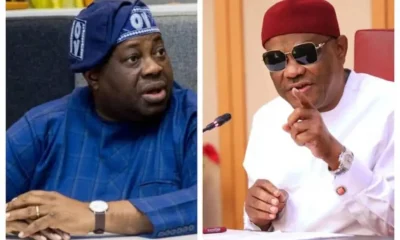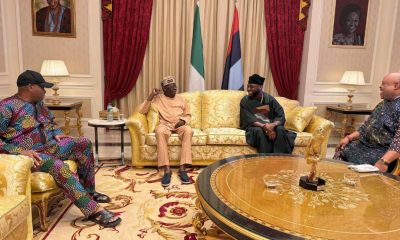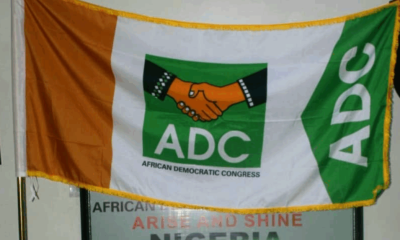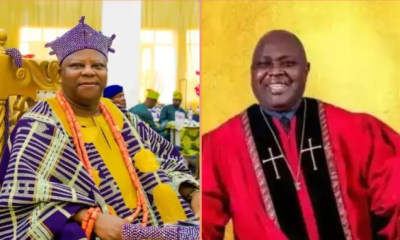Oil & Gas
Marketers plan petrol import as NNPCL, Dangote’s talks drag

Oil marketers may begin the importation of Premium Motor Spirit, popularly called petrol, following the recent declaration by the Nigerian National Petroleum Company Limited that it would only fully offtake the product from the Dangote Petroleum Refinery if the market prices of the commodity were higher than the pump prices in Nigeria.
NNPC also declared that Dangote and other domestic refineries were free to sell directly to any marketer on a willing buyer, willing seller basis, adding that it had no desire or intention to become the distributor for any entity in a free market environment.
This is, however, contrary to what the President of Dangote Group, Alhaji Aliko Dangote, stated last week. The owner of the $20bn refinery had stated that the refinery was waiting for NNPC, adding that the national oil company would be the only off-taker of its petrol domestically.
Reacting to the slowdown in discussions between Dangote and NNPC, oil marketers stated that they would only source the product from wherever they found it cheaper, as this could be through importation.
Commenting on the price of Dangote petrol, the National Operations Controller, Independent Petroleum Marketers Association of Nigeria, Mustapha Zarma, said, “We have not contacted Dangote for now, but we may contact the refinery’s sales department this week to find out the price.
“If the price is competitive enough for one to buy and get his return on investment and the required margin, then we wouldn’t mind purchasing directly from him to complement what NNPC is bringing in or what NNPC would buy from Dangote.”
Zarma confirmed that since the Federal Government and NNPC had said the Dangote refinery would sell its product at the market price, this implied that the government would not intervene in the pricing of the commodity from the plant through subsidy.
Based on this, he noted that other dealers now had the opportunity to source the product from any producer at a cheaper price, whether locally or internationally.
He noted that some oil marketers currently imported diesel, while others bought the product from Dangote, adding that a similar situation would play out in the purchase of petrol, going by NNPC’s recent position on Dangote petrol.
“I believe that we are going to analyse the price of Dangote petrol and see the advantages of buying from Dangote viz-a-viz importation. Whichever we feel is cheaper will automatically attract everybody, especially if importation is cheaper.
“That will bring about competition and I don’t think the government will allow price monopoly. They would want a competitive market where the laws of demand and supply would determine the local price of refined petroleum products, just like diesel is right now.
“And with that, there is going to be some kind of equilibrium in the pricing and there is going to be guaranteed sustainability of supply,” the IPMAN official stated.
Industry observers say the Federal Government seems not ready to stop fuel importation following the refusal of NNPC to be the off-taker of Dangote’s petrol.
They, however, noted that with the recent hike in the pump prices of petrol, the government was systematically stopping subsidies on the commodity, following the recent revelation by NNPC that it spent over N7.8tn subsidising petrol.
At the presentation of the audited report and accounts of NNPC for the 2023 business year in Abuja last month, NNPC’s Chief Financial Officer, Umar Ajiya, admitted that the oil firm was shouldering a heavy subsidy burden on petrol imports.
He said the government directed NNPC to sell the petrol it imported at a price that is half the landing price. According to him, at times the Federal Government paid the money and it could as well net off for it.
While the official pump price of petrol is about N600/litre, the average landing cost is about N1,200/litre. Ajiya said the company covered about N7.8tn in “shortfall” in the first seven months of this year.
“What has been happening is that we have been importing PMS, landing at a certain price, and the government is telling us to sell it at half price. So, that gap between that landed price and the half price is what we call shortfall or we call it a subsidy,” the CFO had stated.
Foreign producers
Also speaking on the development, the National Publicity Secretary of IPMAN, Ukadike Chinedu, said though marketers were ready to buy from Dangote, the revelation from NNPC showed that dealers were free to source their products from any cheaper source.
“From what is happening now, it means that the Petroleum Industry Act is being implemented, the removal of subsidies has come to stay and the price of petrol is to be determined by the economics of demand and supply.
“Now that NNPC has said they are not the sole off-taker of Dangote petrol, it then means that the price of the product would determine where we are going to buy it. If NNPC imports the product and its price is cheaper than that of Dangote, we will buy from NNPC. If Dangote’s price is cheaper than that of NNPC, then we will buy from Dangote. So, right now, competition will set in. Remember that diesel price rose as high as N1,600/litre and Dangote came in with his own at N1,200/litre, and the importers reduced their price to N1,100/litre.
“It further dropped to about N950 and now revolves between N950 and N1,100 for both the imported ones and the ones produced locally. By the time competition sets in, the product will sell cheaper,” Ukadike stated.
On whether marketers had started making plans to import if the imported product would be cheaper, he replied, “Our National President, Alhaji Abubakar Maigandi, has commenced discussions with some investors who are now in the process of securing funds going by the current trend in the business.
“So, we are talking with some foreign partners because you need to understand that independent marketers are the highest buyers of diesel from Dangote refinery because we control about 80 per cent of the filling stations nationwide. So, if Dangote PMS is cheaper we will buy it, but if importation is cheaper, we will go for it.”
President Bola Tinubu recently directed that NNPC should sell crude to Dangote and other domestic refineries in naira.
The President’s Special Adviser on Revenue, Zacch Adedeji, who also serves as Chairman, Federal Inland Revenue Service, explained that the move would mitigate Nigeria’s heavy reliance on foreign exchange for crude oil imports, accounting for roughly 30 to 40 per cent of its forex expenditure.
The revenue chief said that by denominating crude oil transactions in naira, the government expected to significantly lighten its forex burden, with estimated annual savings of $7.3bn. It is also expected to reduce monthly forex expenditure on petroleum products to $50m from approximately $660m.
“Monthly, we spend roughly $660m in these exercises, and if you analyse that, that will give us $7.92bn savings annually,” he stated.
Earlier, the President stated that Nigeria spent N2tn monthly on fuel importation.
The PUNCH reports that while licensed individuals have been importing diesel into Nigeria, NNPC remains the sole importer of petrol under the current administration.
Despite being the largest oil producer in Africa, Nigeria depends on imported petroleum products due to low refining capacity.
In May, Dangote said Nigeria would no longer import fuel the moment his refinery commenced production of petrol.
But unless there is an intervention from the President, Dangote’s plan to end fuel importation may not be achieved anytime soon, even as the $20bn refinery unveiled its PMS last week.
The NNPC, in a statement by its spokesman, Olufemi Soneye, said on Saturday that it would not buy Dangote PMS unless it was cheaper than that of the international market.
This is contrary to claims by Dangote that the refinery was waiting for the NNPC to roll out its product.
On Saturday, NNPC stated that it would only fully offtake petrol from the Dangote refinery if the market prices of PMS were higher than the pump prices in Nigeria.
The NNPC also declared that Dangote and any other domestic refineries are free to sell directly to any marketer on a willing buyer, willing seller basis, saying it had no desire or intention to become the distributor for any entity in a free market environment.
“The recent changes in PMS prices have no impact on the DRL or any other domestic refinery’s access to the Nigerian market. In fact, if current prices are perceived as high, it presents an ideal opportunity for the refinery to sell its products at lower prices in the Nigerian market,” Soneye stated.
Soneye added that Dangote refinery could lower its price if it felt the new prices were too high.
“We emphasise that there is no guarantee of lower prices associated with domestic refining compared to any global parity pricing framework, as confirmed by the DRL. The NNPC Ltd will only fully off-take PMS from the DRL if the market prices of PMS are higher than the pump prices in Nigeria,” the NNPC said.
This statement from the NNPC could be an indication that the NNPC was not ready to stop importation, especially as its refineries ere yet to become operational.
Since the unveiling of its PMS, the NNPC appeared to have turned its back against the Dangote refinery.
While unveiling the 650,000-capacity refinery, Dangote stated that the facility would roll out petrol whenever NNPC was ready.
Dangote disclosed that the petrol would get to the filling stations in the next 48 hours (from Tuesday) after all arrangements with NNPC were concluded, saying the queues would be over soon.
He emphasised that the NNPC would sell and distribute the product, under the current naira crude sale arrangement.
“Once the NNPC is ready, we roll,” Dangote said.
But it seems that talks between the two companies have collapsed and this means fuel importation might continue.
In the past few days, the NNPC has in different statements denied that it would fix the price for Dangote or be its sole distributor.
This was after the state-owned energy firm said it was given a September 15 timeline by the refinery to lift its petrol
‘NNPC evading responsibilities’
A reliable source close to Dangote refinery expressed concerns over the turn of events.
The source, who spoke on condition of anonymity because she was not authorised to speak on the matter, said NNPC had been the one fixing petrol prices over the years, wondering why it was trying to relinquish that duty now.
The source also denied that Dangote refinery gave NNPC a September 15 deadline to lift its fuel.
She added that those making money from fuel importation were the forces trying to stop the sale of Dangote PMS locally.
“Dangote is not a regulator, those in NNPC are just trying to be clever, they want to shift the blame to somebody else. This is something they have been doing for many years.
“Some people are embittered, this is what they have been doing over the years, embezzling money,” our source said.
On pricing, she added, “I don’t know if there is any price for now. We all know what is going on. These is propaganda from these NNPC people. They know what they have done and they want to cover up. Very soon, everybody will know the actual quantity of fuel we consume in this country.”
IPMAN awaits loading
IPMAN president Abubakar Maigandi told one of our correspondents that the independent marketers were waiting for PMS from NNPC Retail.
“We are still collaborating with NNPC. I’ve called their officials and my marketers are supposed to have started loading. They said they would start loading them. So, we are still waiting.
“According to the information from the NNPC, we learnt that there is enough supply. So, we are waiting for them if they truly have enough supply because we already paid,” Maigandi stated.

Oil & Gas
‘No More N797 per litre’ – Nigerians to pay new price for petrol as landing cost reviewed

As the landing price undergoes a significant revision, Nigerians will face a new petrol pump price across the country.
Dangote Refinery has made a significant announcement regarding its pricing strategy by deciding to cease the sale of petroleum products in Nigerian naira.
As a major player in the oil and gas sector, this decision may have wider implications for the market, including fluctuations in fuel prices and impacts on consumers and businesses reliant on stable petroleum costs. Continue Reading.
2027: 91 new political parties emerge as Tinubu searches for Yakubu’s replacement
The price of importing premium motor spirit, commonly referred to as petrol, into Nigeria has risen to N885 per litre, an increase from the N797 per litre recorded just last week.
The Major Energy Marketers Association of Nigeria (MEMAN) confirmed this rise in its daily energy bulletin released on Wednesday. This marks an increase of N88 per litre within a week.
With this increase, petrol prices at filling stations may soon go beyond N1,000 per litre, up from the current range of N940 to N970 per litre.
Currently, the landing cost of petrol stands at N797 per litre, while Dangote Refinery’s ex-depot price is N815 per litre. This has resulted in retail prices at MRS filling stations in Lagos and Abuja ranging from N860 to N880 per litre.
2027: More trouble for El-Rufai as SDP disowns former Kaduna governor
Truth or Dare: Businesswoman Aisha Achimugu declared wanted by EFCC
Oil & Gas
PETROL PRICE WAR: NNPCL tackles Dangote Refinery again, slashed petrol price

The Nigerian National Petroleum Company Limited has made a reduction to its ex-depot price of Premium Motor Spirit, commonly known as petrol, decreasing it from N1,020 to N899 per liter.
This decision, coming days after the Dangote Refinery reduced its price to N899, was confirmed by the Petroleum Products Retail Outlets Owners Association of Nigeria in a statement released on Saturday.
The statement signed by the association’s National Public Relations Officer, Dr Joseph Obele, and quoting a document released by NNPCL’s Commercial Department indicates a reduction based on the regional pricing scheme.
The price indicated that marketers would buy the product at N899 per litre, matching the price offered by the Dangote refinery a few days ago.
Marketers purchasing from Warri, Oghara, Port Harcourt and Calabar will, however, pay N970 per litre to offtake products.
The statement read, “The Nigerian National Petroleum Company Limited has taken a significant step in response to the competitive impact of deregulation in the downstream sector.
“The company recently reduced the ex-depot price of Premium Motor Spirit from N1,020 to N899 per litre.
“The price reduction by NNPCL is seen as a response to the competitive impact of deregulation, which has led to increased competition in the downstream sector.”
Obele noted that the price reduction by the national oil firm is seen as a response to the competitive impact of deregulation, which has led to increased competition in the downstream sector.
He also expressed optimism that PMS prices will drop further before the end of January 2025, given the global decline in crude oil prices and the naira’s recent gain against the dollar.
Obele described the trend as a price war while he emphasized that the price reduction by Dangote Refinery and NNPCL demonstrates the benefits of competition and advocates for the immediate privatization of government-owned refineries.
The move is expected to spark a price war among oil marketers, ultimately benefiting consumers.
However, the NNPCL spokesperson, Femi Soneye, is yet to confirm this development.
Reacting to this development, the National President of PETROAN, Billy Harry, said the price reduction is a welcome development that will bring relief to motorists and Nigerians during the holiday season.
He said, “The reduction in PMS price by NNPCL is a demonstration of the company’s commitment to making petroleum products more affordable for Nigerians.
“We commend NNPCL for responding to our call for affordable PMS prices.”
He also listed the benefits of the price reduction to consumers, including “Reduced transportation costs: With lower PMS prices, motorists will spend less on fuel, leading to increased disposable income.
“Increased economic activity: Lower fuel prices will stimulate economic growth by reducing production costs and increasing demand for goods and services.
“Improved standard of living: The price reduction will lead to a decrease in the cost of living, enabling Nigerians to afford necessities and enjoy a better quality of life.”
Harry also commended Dangote Refinery for its earlier price reduction, which he said had helped to stimulate competition in the downstream sector.
The PETROAN national official also hinted at a report submitted by PETROAN’s technical pricing team, warning that competitive pricing can lead to compromised product quality.
He further urged the Nigerian Midstream and Downstream Petroleum Regulatory Authority to ensure compliance with quality assurance standards.
“PETROAN is calling on the Nigerian Midstream and Downstream Petroleum Regulatory Authority to ensure compliance with quality assurance standards which may arise due to competitive pricing,” he added.
Oil & Gas
Nigeria agrees to 1.5mbpd production quota set by OPEC

Heineken Lokpobiri, minister of state for petroleum resources (oil), says Nigeria will conform with the production quota set by the Organisation of Petroleum Exporting Countries (OPEC).
On June 2, OPEC extended Nigeria’s production quota of 1.5 million barrels of crude per day (bpd) to 2025.
OPEC said Nigeria should maintain the production level till December 31, 2025.
The oil cartel increased Nigeria’s production level to 1.5 million bpd for 2024 at its ministerial meeting on November 30, 2023.
However, Nigeria has been producing below the quota.
Speaking after OPEC’s 56th joint ministerial monitoring committee (JMMC) on October 2, the minister said Nigeria remains fully committed to the objectives of the body’s declaration of cooperation (DoC).
“Nigeria remains fully committed to the objectives of the DoC, and I can confidently confirm that our country is in conformity with the agreed production limits,” he said.
“While we continue to ramp up production in line with our national interests, we are doing so within the framework of OPEC’s guidelines, as we remain committed to balancing responsible production with our economic goals, and continue to meet our obligations under the DoC.”
OPEC RETAINS PRODUCTION OUTPUT POLICY
At the meeting, the oil cartel and its allies, known as OPEC+, retained its oil output policy, including a plan to start raising output in December.
According to a statement by OPEC, the group reviewed the crude oil production data for the months of July and August 2024 as well as current market conditions.
“During the meeting, the Republic of Iraq, the Republic of Kazakhstan, and the Russian Federation confirmed that they had achieved full conformity and compensation according to the schedules submitted for September,” the oil cartel said.
OPEC said the three countries reiterated their resolve to maintain full conformity and compensation throughout the remaining period of the agreement.
Final estimates of September’s crude oil production levels, according to the oil cartel, would be based on authorised secondary sources that would be accessible by the second week of October.
The oil alliance added that it will provide production figures for the nations that are part of the declaration of cooperation (DoC).
“The committee noted the three separate technical workshops between representatives from the Republic of Iraq, the Republic of Kazakhstan, and the Russian Federation and the secondary sources,” OPEC said.
“The meeting was aimed at discussing September production details and submitting their revised compensation plans that include the August overproduction as per the submitted plans to the OPEC Secretariat while also emphasising the need for some members to make further cuts to compensate for overproduction.
“The JMMC emphasised the critical importance of achieving full conformity and compensation. It will continue to monitor adherence to the production adjustments agreed upon at the 37th OPEC and non-OPEC Ministerial Meeting (ONOMM) held on 2 June 2024.
“The Committee will also continue to monitor the additional voluntary production adjustments announced by some participating OPEC and non OPEC countries as agreed upon in the 52nd JMMC held on 1 February 2024.”
Furthermore, according to OPEC, the committee would continuously assess market conditions.
OPEC said the next meeting of the JMMC is scheduled for December 1, 2024.
Oil & Gas
Fuel scarcity looms as NNPCL portal closure delays petrol supply

Petroleum marketers have raised an alarm that the Nigerian National Petroleum Company Limited, NNPCL, portal used for the purchase of Premium Motor Spirit (Petrol) has been shut down against dealers, making it impossible to apply for the commodity.
The spokesperson of the Independent Petroleum Marketers Association of Nigeria, Chinedu Ukadike disclosed this in a statement on Wednesday.
According to him, marketers have more than 2,000 pending tickets for the purchasing of 45,000 liters of petrol.
He hinted that the situation may lead to another round of fuel scarcity nationwide.
“I can’t confirm the price now because the portal is still shut down.
“We have more than 2,000 tickets for 45,000 liters (of petrol). That is 45,000 multiplied by 2,000, you can now know the number of million liters it will be. This is just an estimate, you know I don’t work with NNPCL and I don’t know what is on their system,” Ukadike stated.
He added that a 45,000-litre truckload of PMS is around N39.5 million, making N79 billion when multiplied by 2,000.
Reacting to the development, the spokesperson of NNPCL, Olufemi Soneye admitted that the state-owned firm has a significant backlog to address.
He said that the portal closure was intended to prevent the company from holding marketers’ funds for an extended period.
Soneye assured that the portal would soon be reopened; however, he failed to state the date when it would happen.
“We have a significant backlog to address. The closure is intended to prevent us from holding marketers’ funds for an extended period,” Soneye had explained.
“It will be reopened once the backlog has been sufficiently reduced. We are working to address it as soon as possible,” he stated.
The development comes as Nigerians struggle with high energy costs.
Recall that NNPCL in September 2024 announced a fresh price increase for petrol nationwide after lifting the product from Dangote Refinery.
Nigerians currently buy petrol between N950 and N1,100 per liter nationwide.
Oil & Gas
Diesel import into Nigeria increases by 22.66 percent

The import of Automotive Gas Oil (Diesel) into Nigeria increased by 22.66 percent to 4.94 billion liters in 2023 from 4 billion liters in 2022.
The National Bureau of Statistics disclosed this in its latest Petroleum Products Distribution Data released recently.
The data also showed that 109.39 million liters of Diesel were locally produced in 2023, compared to 102.47 million liters reported in 2022.
This represents a 6.76 percent growth rate in locally produced diesel in Nigeria.
Comparatively, Nigeria heavily depends on the import of diesel to meet its consumption demand based on the NBS data for 2023.
On the other hand, the Data also showed that the import of Premium Motor Spirit (petrol) dropped 13.77 percent to 20.30 billion liters in 2023 compared to 23.54 billion liters in 2022.
Recall that in April 2024, Dangote Refinery commenced the domestic sale of diesel in Nigeria.
Oil & Gas
Why NNPC prioritises Dangote for first phase of naira crude sale

The Nigerian National Petroleum Company (NNPC) is prioritising supplying naira-denominated crude oil to the Dangote Refinery in the first phase of a naira-for-crude scheme, a development expected to positively impact the domestic fuel supply chain and enhance transparency.
Oil transactions in Nigeria are often conducted in US dollars, given the international nature of the oil market and the global reliance on the dollar for such trade.
However, the Federal Executive Council recently adopted a proposal by President Bola Tinubu to sell crude to Dangote refinery and other upcoming refineries in naira.
The federal cabinet approved that the 450,000 barrels meant for domestic consumption be offered in naira to Nigerian refineries, using the Dangote refinery as a pilot. The exchange rate will be fixed for the duration of this transaction.
Eche Idoko, publicity secretary of CORAN said the federal government had promised to only supply crude oil to the Dangote refinery as it was the “only refinery producing petrol”.
“We were present at the inaugural meeting where the federal government did make us understand that they would want to start the naira sales in phases. That they would start with refineries that are producing PMS first and extend it to other refineries and that’s where they are right now and we can say the first phase of the naira sales will start in October,” Idoko said.
“No other refinery (apart from Dangote refinery) is selling petrol at the moment but I know that there are other refineries working on their plants that would be producing petroleum like the Clairgold refinery which intends to produce PMS.
“There is also Aradel which is working on their PMS plant. There is also Azikel Petroleum Refineries, which is also working on producing PMS.
“The last I heard with respect to that arrangement, the October date still remains and we have spoken with people at Dangote and they said conversations are ongoing.”
However, he said the details of the transactions would be made known when the federal government makes the announcement.
“For instance, are they going to discounts as in the normal practice when you are selling crude to the international traders? If there is going to be a discount, that is what will guarantee the reduction in price of petroleum products,” Idoko said.
“We also want to know at what rate is the exchange rate pegged. Is the federal government intending to maintain the N1,600 exchange rate?”
He said Nigerians would know the potential price of petroleum products when all the details are unveiled.
On September 13, 2024, the Technical Sub-Committee on Domestic Sales of Crude Oil in Local Currency announced that the Federal Executive Council under the leadership of President Bola Tinubu approved the sale of crude to local refineries in naira and the corresponding purchase of petroleum products in naira.
“From October 1, NNPC will commence the supply of about 385kbpd (385,000 barrels per day) of crude oil to the Dangote refinery to be paid for in naira,” the committee had declared.
The chairman of the Technical Sub-Committee is Zacch Adedeji, who doubles as chairman of the Federal Inland Revenue Service.
Dare Adekanmbi, the special adviser on media to the FIRS Chairman told Journalists that the committee is working day and night to ensure that things go according to plans.
The panel explained in September that this initiative would help reduce pressure on the naira, eliminate unnecessary transaction costs, and improve the availability of petroleum products across the country.
“Since then, the implementation committee chaired by the Minister of Finance and we, the technical committee, have worked intensely with NNPC and Dangote refinery to fashion out the details of the modalities for the implementation of the FEC approval,” Adedeji had stated.
While stating that crude would be sold to Dangote in naira from October 1, the committee chairman and FIRS boss said, “In return, the Dangote refinery will supply PMS (petrol) and diesel of equivalent value to the domestic market to be paid in naira.
“Diesel will be sold in naira by the Dangote refinery to any interested off-taker. PMS will only be sold to NNPC. NNPC will then sell to various marketers for now. All associated regulatory costs (NPA, NIMASA, etc.) will also be paid in naira. We are also setting up a one-stop shop that will coordinate service provision from all regulatory agencies, security agencies, and other stakeholders to ensure a smooth implementation of this initiative.”
Adedeji explained that the technical committee that worked to flesh out the initiative would transition to an implementation execution and monitoring committee working out of Lagos for the next three to six months.
The committee, which includes Lydia Jafiya; the permanent secretary of the Federal Ministry of Finance; the FIRS boss, as well as representatives from NNPC, Central Bank of Nigeria, AfreximBank, and the Nigerian Upstream Petroleum Regulatory Commission, was set up to craft a robust template that will ensure the successful implementation of the initiative.

 Sports2 weeks ago
Sports2 weeks agoOfili: ‘Nigeria doesn’t deserve you’ – Fans react as athlete switches allegiance to Turkey

 News2 weeks ago
News2 weeks agoUS Back Out: Angry Trump withdraws support for Israel, issues fresh warning, “Do not drop those bombs”

 Sports2 weeks ago
Sports2 weeks ago‘Don’t sign him, he doesn’t follow instructions’ — Club warned against signing Super Eagles star

 Spotlights2 weeks ago
Spotlights2 weeks agoNo More War: US plots Donald Trump impeachment over unauthorized Iran bombing
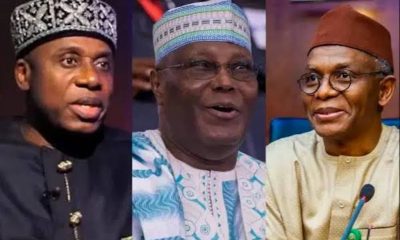
 Spotlights2 weeks ago
Spotlights2 weeks agoAtiku sidelined again as ADA picks Presidential Flagbearer

 Politics1 week ago
Politics1 week agoFresh crisis hits coalition as El-Rufai, Obi may pull out over Atiku’s silence game

 Politics2 weeks ago
Politics2 weeks ago2027: Shettima fights back over plot to drop him as Vice President; crisis hits APC




